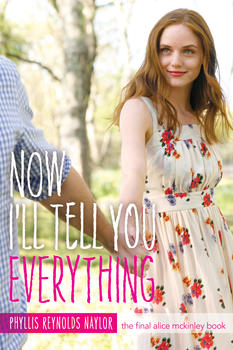Phyllis Reynolds Naylor Talks Inspiration, Writing, and Alice…

by Nichole Graham
Most people know Phyllis Reynolds Naylor for her Newbery Award winning book “Shiloh.” A heartwarming story about a boy and his dog that left us all wanting justice and revenge on Judd Travers. Phyllis Reynolds Naylor has written more than 140 books, most for young adults. “Shiloh” is a book that’s discussed in classroom all across America and the Alice series has made such a connection with teenage girls that it has its own blog. Phyllis lives right here in Montgomery County and was nice enough to take some time out of her busy schedule to answer a few questions.
What or who inspired you to be an author?
My guess is that it was the fact that my parents read aloud to us every night, almost until we were in our teens. They read with great drama and feeling, and this was the happiest part of my growing up. Mother read books like the Bible story book, “Alice in Wonderland” and “The Wind in the Willows,” and my Dad read the books of Mark Twain. I think I must have decided that if listening to these stories was so delicious, then writing them must be even better, and this was my hobby as a child, using the backs of scratch paper—the only thing available to us during the Depression.
You’ve written many books for children and young adults, what was your favorite book as a child?
“Huckleberry Finn.” People have said that my book “Shiloh” has some of the same elements—a boy wondering what is the right thing to do—society’s rules or what his heart tells him is right. But I wish I had the Alice books when I was a young girl, and even later. That’s probably why I decided to write them—for the daughter I never had.
Where do you get the ideas for your stories?
This is probably the question writers are asked the most, and the most difficult to answer, because the answer is simply, everywhere. From things that have happened to me, things other people have told me, things I read about in the newspaper, but most of all, from my imagination. Just little bits of things from everywhere, all mixed together. I have the problem of too many ideas all coming at once, and I feel as though I’m batting them away, trying not to let them interfere with the manuscript I’m working on at present.So it can be a curse as well as a blessing.
The Alice Series is all about what it’s like for a girl growing up. If you could give one piece of advice to girls today, what would it be and why?
I suppose it would be that there isn’t one thought or one feeling you’ve had that millions of other girls haven’t thought or felt. If you think you have had or done the most immature, ridiculous, humiliating thing that a girl has ever done, there are thousands who could match it with a story of their own. If you think you’ve had fantasies that nice girls never have, you couldn’t be more wrong, and there’s a world of difference between the things you fantasize and the things you actually do.
How old were you when you started writing?
I know I was making up stories in kindergarten, because the teacher wrote some of them down and sent them home with me. But I think I was in 4th or 5th grade when I began making little “books,” illustrating them, and reading them aloud to my mother.
How long does it take for you to write a book?
This depends so much on the book. I think that the first draft of “Shiloh” took only six weeks because I was so emotionally involved in that story. Other books of mine have taken a year or more, and some have been on the drawing board of my brain for more than a decade. The Alice books came to me easiest of all, I think, because I so identified with her.
How often do you write?
Every day. If I’m not actually putting words on paper, I’m staring off into space rethinking the plot or the theme or a particular scene in the book. Sometimes I work off and on from eight in the morning until almost midnight, simply because it’s going so well, or I’m so desperate to get something right. But the writing of one book is almost always continually being interrupted by galley proofs arriving from another book that I must correct and get back to the publisher. Or someone sends a jacket cover for a book-to-be and I have to take time to think about it, and send a comment. There are so many parts to getting a book done, that the actual writing of the words is only some of it.
What advice you have for kids who love writing and want to become authors?
Read, read, read and write, write, write. Enter every writing contest you can. Form a little critique group if you can, of people your own age, where you can read your things aloud and get comments and criticism and encouragement from others. Welcome any chance you have to turn an assignment into an essay or a story. If you love to write but sometimes have difficulty thinking of an idea, think about the time you were most embarrassed, angry, sad, or scared, and write a paragraph about it. Then rewrite it, making it happen to someone else. Change the beginning, the ending, or anything else you think of. Turn it over to your imagination and give it wings. Make it the story or poem or essay that only you can write.
You touch on some very serious issues in your books such as mental illness and death. What made you start writing about these issues for young adults?
I like to write about all kinds of things—happy, sad, scary…. No child or young person has a completely happy life. Sad things happen, sometimes extremely scary things, and it helps to know that others have experienced this too, by reading about it in a book—seeing how others cope.
What was it like to win the Newbery Medal for “Shiloh”?
It would be wonderful if every writer had the chance to win the Newbery Award. It’s an extremely exciting time for the writer, the editor, the publishing company, the agent,etc. I think I read somewhere that a book that wins the Newbery award usually sells more copies than those winning the National Book Award or the Pulitzer. This doesn’t mean it’s a better book; it’s probably because so many schools and libraries automatically buy the Newbery winners, and so many children study them in school. It seemed that once I received that call—which I was most certainly not expecting—the rest of the day was a blur of phone calls, flowers, photos, and packing to go to New York for “The Today Show.” You are happy and scared half out of your wits, all at the same time.
“Shiloh” has become one of your most popular books and is read in classroom all across the country. It has become a book that is cherished by many. Did you ever imagine this book would be a book kids would be reading for decades after it was written? How do you explain it’s success?
No, I did not, especially because one respected reviewer wrote, “…This is not one of Naylor’s best works.” (He felt that the dialect would limit readership). I think that almost every child has the experience of sometime in his life being unfairly treated by an adult—a parent, a teacher, a team manager… someone. Or an adult doesn’t do what he promised. It was the rage readers felt toward Judd Travers that prompted me to write the two sequels to help explain how Judd got to be the miserable man he was. And if a reader can’t identify with Marty, he can certainly identify with the dog.
Where do you get the ideas for your characters?
My books tend to start with a situation. And then I ask myself, “What kind of boy would it be who would go to such lengths to save a dog?” And “What kind of moral compass is the father using in this book?” Alice was easy in the Alice series because she is so much like me. The character I had most fun with was Alice’s brother, seven years her senior. Whenever the plot called for a long dialogue between Alice and Lester, it was a fun day for me. They often made me laugh out loud. I’ve always felt that if a supposedly funny scene or dialogue in a book does not make me laugh out loud, or if an especially sad scene does not bring tears to my eyes, then it doesn’t work that way for my readers either.
You have written over 135 books, [142 books, actually] do you still enjoy writing or do you see it more as a job?
I LOVE it. I would not do it if I didn’t. There are parts of it that are drudgery, of course. I very much dislike reading galley proofs looking for misspellings or punctuation mistakes. Research tires me out. But I don’t begin a book until I’m sure of the beginning, the climax and the ending, plus some of the bigger stepping stones along the way. It’s all the little in-between stuff that comes to me as I write, that surprises me, that is the fun part, and I really can’t think of an occupation I would rather have.
 Phyllis Reynolds Naylor is the author of more than 140 books for both children and adults, including Newbery-award winner “Shiloh” and the popular Alice series about a girl growing up in Silver Spring. Her latest book in the Alice series is “Now I’ll Tell You Everything.” Phyllis writes serious and coming-of-age novels, as well as humor, mystery, fantasy, suspense, animal stories, gothic horror and adventure. She will be speaking about what it is like to say goodbye to a girl who has taken up six months of Phyllis’ life for each of the past 28 years, and what is coming next. She has lived in the Washington metropolitan area since 1958.
Phyllis Reynolds Naylor is the author of more than 140 books for both children and adults, including Newbery-award winner “Shiloh” and the popular Alice series about a girl growing up in Silver Spring. Her latest book in the Alice series is “Now I’ll Tell You Everything.” Phyllis writes serious and coming-of-age novels, as well as humor, mystery, fantasy, suspense, animal stories, gothic horror and adventure. She will be speaking about what it is like to say goodbye to a girl who has taken up six months of Phyllis’ life for each of the past 28 years, and what is coming next. She has lived in the Washington metropolitan area since 1958.


